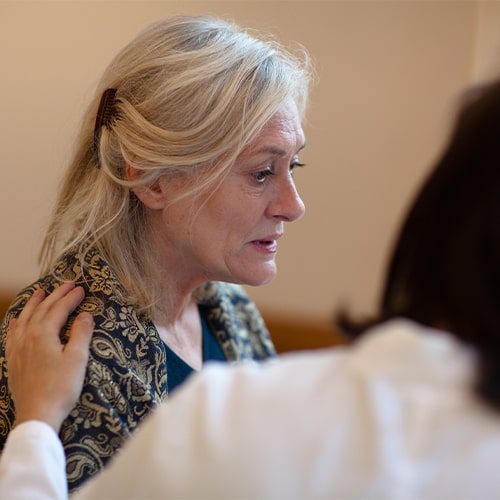Alzheimer’s Disease: What Is It And What Are The Symptoms?

Alzheimer’s disease is a progressive neurological disorder and the most common form of dementia (an umbrella term that encompasses a range of neurological conditions). It is most known for its impact on cognitive function, affecting memory, thinking and behaviour. Hearing that a loved one has Alzheimer’s can feel overwhelming, but with the right support and care, the good news is that quality of life can be maintained.
As the most attentive dementia care home Dorset has to offer, LuxuryCare provides compassionate neurological care in a homely environment. When you’re seeking a dementia care home in Poole or Bournemouth, you can expect our expert team to deliver personalised care for elderly residents, ensuring dignity, engagement and peace of mind. Our teams are dementia care specialists, which includes expert knowledge on Alzheimer’s, including symptoms and the progression of the disease.
In this blog, we share everything there is to know about Alzheimer’s, so you know where to turn when you need some information.
What is Alzheimer’s?
Alzheimer’s disease is a progressive neurological condition that gradually affects the brain, changing how a person remembers, thinks and manages everyday tasks. In the early stages, someone might forget recent conversations or misplace items more often.
As the condition advances, it can become harder to follow simple instructions, recognise familiar faces or complete routine activities like cooking, dressing or handling money.
Although Alzheimer’s develops differently for everyone, it steadily reduces independence and can cause frustration for both the person living with the disease and their loved ones. This is why finding the right support matters so much.
Residential care homes equipped to provide dementia care for elderly residents offer tailored assistance with daily routines, while ensuring safety and dignity. For families, compassionate help can be provided in a comfortable setting by choosing the right care home. Dorset is home to such a provider.
At LuxuryCare, our approach is to create a familiar environment where personalised activities and routines encourage engagement and well-being. By focusing on individual strengths and preferences, we aim to make every day meaningful – giving families reassurance that their loved one is receiving the attentive, professional care they deserve.


Early Symptoms
Early symptoms of Alzheimer’s disease appear gradually and can be mistaken for normal ageing. Recognising these signs can help families seek support and a diagnosis early. Early symptoms include:
- Forgetting recent conversations or events
- Misplacing items
- Struggling to recall names of familiar places and objects
- Finding the right words difficult
- Asking the same questions repeatedly
- Showing poor judgement or difficulty making decisions
- Becoming less flexible and hesitant to try new activities
- Mood changes, such as increased anxiety or agitation
- Periods of confusion
These signs do not always mean a person has Alzheimer’s, but they indicate a closer look is needed. If you notice these symptoms in yourself or a loved one, speak with a GP for assessment.
Early diagnosis allows for planning, access to care options and support to help maintain quality of life and slow down deterioration. Recognising these changes can help families explore residential care homes and specialist neurological care.
Middle-Stage Symptoms
As Alzheimer’s disease progresses into the middle stage, memory problems worsen, and new symptoms often appear. Someone may find it increasingly difficult to remember names and may struggle to recognise family and friends. Other common middle‑stage symptoms include:
- Increasing confusion and disorientation, such as getting lost or not knowing the time of day
- Obsessive, repetitive or impulsive behaviour
- Delusions or feelings of paranoia towards carers or family
- Problems with speech or language (aphasia)
- Disturbed sleep patterns
- Frequent mood swings, depression, anxiety or agitation
- Difficulty judging distances and other spatial tasks
- Hallucinations, such as seeing or hearing things others do not
By this stage, most people with Alzheimer’s need help with everyday activities. They often require the level of support provided at our care homes across Poole and Bournemouth to assist with basic eating, washing, dressing and using the toilet, ensuring safety, comfort and dignity.


Later-Stage Symptoms
During the later stages of Alzheimer’s disease, symptoms become increasingly severe and can be distressing for the person and their loved ones. Common late‑stage symptoms include:
- Hallucinations and delusions that worsen over time
- Increased suspicion, agitation and sometimes aggressive behaviour
- Difficulty eating and swallowing (dysphagia)
- Difficulty moving or changing position without help
- Significant weight loss
- Urinary and bowel incontinence
- Gradual loss of speech and communication ability
- Severe short‑ and long‑term memory loss
It’s at this point that people require full‑time support with personal care, mobility, eating and safety. Residential homes equipped to provide specialise neurological and dementia care for elderly residents are vital as they provide round‑the‑clock assistance in a caring environment.
These are staffed by qualified carers trained to deliver compassionate neurological care, ensuring dignity and comfort at every moment. Bespoke care plans, high‑quality facilities and family involvement help ease stress for both residents and their loved ones.
How LuxuryCare Supports Residents with Alzheimer's
At LuxuryCare, we support each resident with a bespoke care plan tailored to their individual needs and preferences. We work in ways that stimulate memory and encourage social interaction while nurturing well-being through engaging activities and days out. Our homes located across Dorset, including Branksome Park, are equipped with comfortable rooms and facilities to promote a homely environment.
We adopt a lifestyle‑focused dementia care approach based on the Dr Gemma Jones’ Behavioural Staging Model. This maintains quality of life, independence and dignity, while providing compassionate neurological care with amenities, making every day truly rewarding for residents and families.
Why Choose LuxuryCare?
Meeting basic and medical needs is one part of care; at LuxuryCare, we believe residents deserve a rich, varied life. Our modern residential care homes in Dorset offer private rooms with breathtaking seafront views, communal areas with amenities and meticulously maintained gardens for afternoon strolls.
Every day we organise engaging activities – from baking classes and quizzes to woodworking – as well as regular days out to Bournemouth Pier, local theatres and cafés. Our dedicated catering team prepares freshly made, locally sourced meals tailored to each resident’s dietary needs via a personalised food passport. Families are even welcome to join BBQs and annual fireworks shows.
Let LuxuryCare Take Care of Your Loved Ones
Contact LuxuryCare to discuss how we can support your loved one at every stage of Alzheimer’s disease. Visit our ‘About Us’ page to learn more about our values and explore our ‘Homes’ page to learn more about each of our care homes.
No matter the stage of Alzheimer’s your family member is facing, LuxuryCare is here to provide compassionate, personalised support and guidance.















